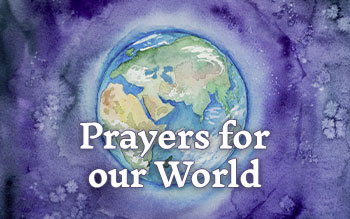Displaying items by tag: East Africa
East Africa: heavy flooding causes many deaths and displacements
Heavy flooding in Kenya, after weeks of intense rain and flash floods, has left at least 103 people missing, with 71 confirmed dead. Most of the missing are from Mai Mahiu, near Nairobi, where on 29 April flooding near a railway bridge, caused by a clogged tunnel, caused at least 45 deaths. The country’s president William Ruto has ordered the military to help search and rescue efforts. Nearly 191,000 Kenyans have been displaced by the floods, which are said to have been exacerbated by the effects of El Niño. The government has established 52 displacement camps to provide temporary shelter, but with more rain forecast the situation may worsen. The floods have affected other countries: a week ago, Tanzania’s president said that 155 people had been killed and 200,000 displaced. See
Horn of Africa: unprecedented famine
Unprecedented famine grips parts of Africa. Four years of droughts, Covid-19, and the Ukraine war have created dire conditions. In Somalia, Ethiopia, and Kenya, one person dies from hunger every 48 seconds. Water sources and wells have dried up. Crops have failed, livestock have died, and 22 million people may starve. Many farmers only grow enough to feed themselves. Many relying on livestock see their animals die. Families forced to flee looking for food embark on very perilous journeys. The level of pain and suffering is devastating. Half of Somalia’s population are experiencing crisis hunger levels. One in three children face chronic malnutrition. Before Ukraine’s war Somalia imported 90% of its wheat from Russia and Ukraine, Ethiopia imported 42%. Kenya 44%, plus oil, iron, steel, and fertilisers. In late August, the first grain shipment from Ukraine brought 23,000 tons of wheat - enough for 1.5 million for a month, a drop in the bucket for needy millions. See also the Europe article on Ukraine cargo ships leaving.
Persecution and other dangers amid coronavirus
During the coronavirus lockdown, Nigerian Fulani militants have murdered a five-year-old child they snatched from a pregnant mother, another nine Christians including two children, and a second pregnant woman In Egypt, seven Islamist terrorists, suspected of plotting to attack Christians under cover of the nightly coronavirus curfew, were shot dead. In West Africa, Boko Haram leader Abubakar Shekau declared coronavirus a ‘product of evil’ while he mocked health measures and stepped up attacks. In East Africa the arrival of a second invasion of ravenous young locusts, spawned in Ethiopia, is feared to be twenty times more severe than the plague that devastated crops in January. Iran is facing major challenges. Its slow response to the pandemic, lack of transparency, and absence of an exit strategy, together with the US sanctions and the fall of oil prices, have compromised its healthcare system, its economic situation, and the daily lives of its people.
East Africa: coronavirus in locust-infested regions
By 2 April, there were 5,999 recorded coronavirus cases in Africa. 374 were in East Africa, a region already severely impacted by a plague of locusts and a food security crisis. WHO warned that Africa must ‘wake up’ and ‘prepare for the worst’ against the coronavirus pandemic. The UN has warned of an impending food crisis in East Africa, and concern is growing for Christians in affected regions, many of whom already face marginalisation and persecution for their faith. Pray for all people in East Africa as they are doubly tested by the coronavirus outbreak and the terrible locust swarms. Ask God to meet their needs and may they be comforted in the knowledge of God’s love for them. South Sudan is currently virus-free; may it remain so.
East Africa faces new locust threat
The locusts are swiftly breeding and their numbers could increase 400-fold by June if the infestation is left unchecked, the UN has warned.
Countries in East Africa are racing against time to prevent new swarms of locusts wreaking havoc with crops and livelihoods after the worst infestation in generations.
A lack of expertise in controlling the pests is not their only problem: Kenya temporarily ran out of pesticides, Ethiopia needs more planes and Somalia and Yemen, torn by civil war, can't guarantee exterminators' safety.
Locust swarms have been recorded in the region since biblical times, but unusual weather patterns exacerbated by climate change have created ideal conditions for insect numbers to surge, scientists say.
Warmer seas are creating more rain, wakening dormant eggs, and cyclones that disperse the swarms are getting stronger and more frequent.
In Ethiopia the locusts have reached the fertile Rift Valley farmland and stripped grazing grounds in Kenya and Somalia. Swarms can travel up to 150 km (93 miles) a day and contain between 40-80 million locusts per square kilometre.
If left unchecked, the number of locusts in East Africa could explode 400-fold by June. That would devastate harvests in a region with more than 19 million hungry people, the U.N. Food and Agriculture Organization (FAO) has warned.
Uganda has deployed the military. Kenya has trained hundreds of youth cadets to spray. Lacking pesticides, some security forces in Somalia have shot anti-aircraft guns at swarms darkening the skies.
Everyone is racing the rains expected in March: the next generation of larvae is already wriggling from the ground, just as farmers plant their seeds.
"The second wave is coming," said Cyril Ferrand, FAO's head of resilience for Eastern Africa. "As crops are planted, locusts will eat everything."
The impact so far on agriculture, which generates about a third of East Africa's economic output, is unknown, but FAO is using satellite images to assess the damage, he said.
PESTICIDE SHORTAGES
This month, Kenya ran out of pesticide for about a week and a half, he said. Farmers watched helplessly as their families' crops were devoured. In Ethiopia, the government can only afford to rent four planes for aerial spraying, but it needs at least twice that number to contain the outbreak before harvesting begins in March, Zebdewos Salato, director of plant protection at the Ministry of Agriculture, told Reuters. "We are running out of time," he said.
Meanwhile, locusts - which have a life cycle of three months - are breeding. FAO says each generation is an average of 20 times more numerous. When eggs hatch, as they are doing now in northern Kenya, the hungry young locusts are earthbound for two weeks and more vulnerable to spraying than when they grow wings.
After that, they take to the air in swarms so dense they have forced aircraft to divert. A single square kilometre swarm can eat as much food in a day as 35,000 people. FAO said containing the plague will cost at least $138 million. So far, donors have pledged $52 million. Failure means more hunger in a region already battered by conflict and climate shocks.
Since 2016, there have been droughts in Kenya, Somalia, Ethiopia, then floods, Ferrand said. In South Sudan, more than half the population already faces food shortages.
By Omar Mohammed and Dawit Endeshaw
More at: https://news.trust.org/item/20200227122340-3t5r8
Pray: that sufficient resources, pesticides and planes will be made available to tackle this problem before it escalates or spreads further.
Pray: for a divine intervention that will stop the breeding and spread of these swarms in their tracks.
Pray: into this prophetic word from David Sseppuuya that these nations will seek repentance that will lead to restoration.
Pray: for the Church to rise up in these countries and to take a spiritual lead. (Joel 2:15-17)
East Africa: starvation in refugee camps
Famine continues, and refugee camps in Kenya and Uganda continue to fill. Church leaders in Uganda, Kenya and South Sudan have launched another desperate appeal for food aid to keep refugees and churchgoers alive until Christmas, after enduring an 18-month-long period of droughts, famine and conflict. Archbishop Stanley Ntagali of Uganda said, ‘The numbers and the need are overwhelming. I appeal to you all to help us so that we can help these helpless people, the refugees from South Sudan.’ The refugees, having fled famine and conflict in their homeland, are now living in Camp Rhino, northern Uganda. Most of their food aid is provided by Barnabas Fund, working through the Church of Uganda. Every day, 300 refugees from South Sudan arrive in the camp. The numbers have risen to 120,000, and are predicted to go even higher. A large proportion are women and children.
East Africa: food crisis
A missionary helping the 24 million people in East Africa dying of starvation has criticised the media for being so ‘distracted’ by Donald Trump that they're failing to notice the worst humanitarian crisis to hit the region since World War 2. Aid worker Paul Healy says that in his twenty years working with Trócaire, a charity set up by the Irish Catholic Church, he's never seen such devastation. ‘The scale of the crisis is enormous. There are 24 million people facing starvation over the coming months,’ he said. The UN has already declared a fully-fledged famine in parts of South Sudan, adding: ‘This means 20% of households face extreme food shortages, 30% of the population face acute malnourishment and there are 2 hunger-related deaths per 10,000 people per day.’. Also Somalia, Kenya and Ethiopia will suffer mass death from food and water shortages if ‘prompt and sustained humanitarian intervention’ doesn't happen soon.






